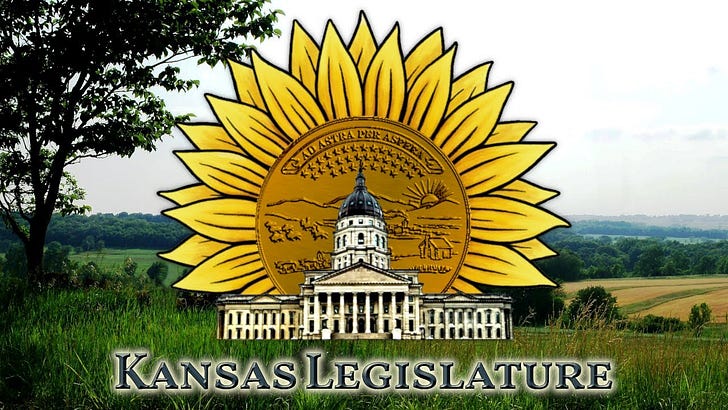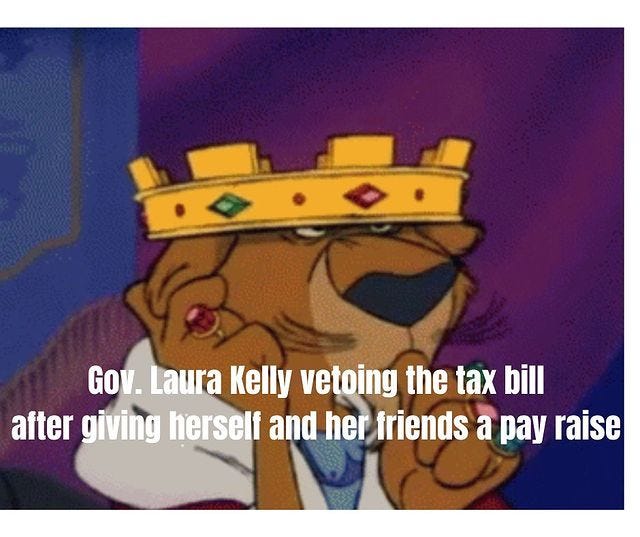Governor Kelly vetoes tax cut, flat tax bill after $60,000+ pay raise
Article/Government and Taxes - 9 minute read
A recent controversy has come to light around Kansas Governor Laura Kelly (D) as she signs and vetoes bills. One bill she signed on Thursday, April 20, 2023, H Sub for SB229, raises her annual salary from $110,707 to $174,000—equivalent to what a Congressman earns, this is a pay raise of $63,293. Kansas Attorney General Kris Kobach (R) also benefits from this bill as well, having his pay go from $98,901 to $169,650, a pay raise of $70,749. Other statewide officials make a little over $86,000 but this could also change under this bill as the secretary of state, state treasurer and commissioner of insurance would start making $160,950. Judges would also see a pay raise tied into what federal judges make. Something else that is important to note is that this pay increase does not start until January 2025, right after the 2024 election season.
The majority of the Kansas Legislature seems to be in favor of the pay increases—hence, why it made it to the governor in the first place. This bipartisan bill passed the House 76-46, and 25-8 in the Senate. However, there are some who are less happy, especially after feeling like Governor Kelly is not being a “middle of the road” governor.
“Governor Laura Kelly gave herself a pay raise from $110,707 to $174,000 beginning January 2025 but VETOED the bill ending food sales early, eliminating the social security cliff, reducing property taxes, increasing the standard deduction and flattening our tax rate immediately,” Kansas Rep. Stephen Owens (R—Hesston) wrote on his Facebook page. “Not much "middle of the road" governing coming out of the Executive Branch this session.”
It is interesting that he doesn’t specify what bill it is, but it is important to note that Rep. Owens voted in favor of it. In fact, House Republicans were largely for this bill with 60 of the 85 voting in favor of it while 16 of the 40 House Democrats voted in favor of it.
Earlier that day Rep. Owens was in a Joint Meeting of Senate Ways and Means and House Appropriations Committees. This information came up by Secretary of Administration Adam Proffitt after being questioned by Rep. Steven Howe (R—Saline County), who did vote against the bill. Rep. Owens made his frustrations clear on the idea of “meeting in the middle” during this meeting.
“You know this idea that we like to talk about meeting in the middle was just vetoed,” Rep. Owens said. “And it’s something that we hear about quite often. This idea of meeting in the middle because we know this is a compromise opportunity. And the opportunity for compromise was just vetoed and I’m very concerned that people aren’t going to get the relief that they so desperately need due to that happening.”
The vetoed bill Rep. Owens is referring to is House Substitute for SB169, which Governor Kelly vetoed earlier that same day.
“The people who would benefit the most from the flat tax, by far, are Kansans making more than $250,000 a year,” Governor Kelly claimed in regards to the bill. “Meanwhile, middle-class taxpayers would see less than $8 per month in actual savings.”
Speaker of the House Dan Hawkins (R—Wichita) issued the following statement regarding the vetoed bill,
“In these times of economic uncertainty when Kansans need tax relief more than ever, it’s especially careless and out-of-touch for Governor Kelly to veto this broad, sustainable tax policy that provides tax relief to ALL Kansans. SB 169 provides income tax relief regardless of income level, a reduction of the tax on Social Security, a faster end to the food sales tax, tax relief for small businesses, a simpler single income tax rate, and a reduction in residential property taxes. This tax relief passed the House with a bi-partisan super majority and we intend to override the Governor’s veto for the benefit of all Kansas taxpayers.”
Kansas Economist Michael Austin took to social media urging people to contact their state representatives and state senators to override the veto. He listed out five things this bill would do, including:
Making tax filing simpler,
Eliminating income taxes for the most vulnerable Kansans,
Making retirement more affordable,
Preventing inflation tax hikes, and
Lowering property taxes.
Over a week before Governor Kelly vetoed this bill, there was speculation that she was going to veto it for one specific reason: It created a flat tax of 5.15 percent.
“Democrats and some economists argue setting the same income tax rate for nearly everybody lifts much of the burden off wealthier Kansans and threatens the state’s ability to pay for schools, prisons and other government services,” KAKE News reported on April 14, 2023. “They contend such a radical change to the state’s tax code poses a special risk when the possibility of a national recession looms so large.”
Governor Kelly proposed a one-time tax rebate of $450 per person, or $900 for married couples, delivered this summer as an alternative. These one-time rebates would cost $800 million.
Currently, there are three existing tax codes in Kansas ranging from 3.1 percent to 5.7 percent. Should the bill get overridden, all Kansans would be taxed 5.15 percent. Kansas News Service broke down what this would mean.
“Instead of paying taxes on the first $15,000 of income, or the first $30,000 for married couples filing jointly, no one would pay any taxes on their first $6,000 of income, or $12,000 for married couples. So even though people in the lowest current tax bracket would see their rate go from 3.1% to 5.15% percent, they'd still pay less in state income taxes.”
This is something that The Sentinel also echoed, providing the following example:
“A family of four with a $250,000 gross income that takes the standard deduction pays $11,366 in state income tax, which is 4.55% of gross income. That same family with a $40,000 gross income only pays $551 in tax, or 1.38% of gross income. There is still progressivity in the flat tax because those with lower incomes have a higher proportion of their income that is exempt from taxation ($6,150 single and $12,300 married).”
As of this publishing, 31 states including Kansas and the District of Columbia have gradual-rate income tax, 13 states have a flat income tax, and 7 states don’t have an income tax.
Americans for Prosperity Kansas took to Instagram and started roasting Governor Kelly for her actions.
State Legislators may also get large pay increases
On top of all this, Kansas state legislators will also get a pay increase. According to reporting from The Topeka Capital-Journal, many Kansas legislators “worried that the traditional pay rate of $88.66 per day, plus an additional $157 per day for meals and lodging, blocked younger individuals, the middle class and people of color from serving in Topeka.”
$88.66 plus $157 a day equals $245.66 a day. For an eight hour work day, this would come out to $30.71 per hour. The average salary in Kansas is $23.78 an hour according to ZipRecruiter. Kansas Senator Tom Hawk (D) sponsored the bill just before he left office January 10 of this year.
The Legislators would not be getting a small increase in pay either. They would still get the $157 a day for meals and lodging, but instead of receiving $88.66 a day, they would receive $320 a day. Understand, going from $88.66 a day to $320 a day would be like working for $11.08 an hour full-time and then giving yourself a $28.92 pay raise just because you could, except instead of it coming from a “boss” you’re taking it from the people you’re supposed to serve. Furthermore, legislators already receive an “allowance” of $354.15 paid every two weeks starting once the legislative session is over. However, under this bill, even this would increase to $375.40.
All of these pay increases come out to about $50,000 a year, despite the fact that being a state representative or state senator has largely been understood to be more of a part-time service rather than a full-time career. Nevertheless, many Kansas Republicans and Democrats are for the pay increase.
The Topeka Capital-Journal also reported that “it would let legislators receive a pay raise without ever voting on it directly. This has been touted as a way to avoid the appearance of a conflict of interest and to banish potential political blowback.
“But it also engendered criticism, particularly when the Kansas House passed the final version of the bill in the middle of the night earlier this month.”
The enactment of SB 10 would increase expenditures for the Legislature and the Legislative Coordinating Council starting in fiscal year (FY) 2025 by $4,618,824 for the Legislature and $27,119 for the Legislative Coordinating Council, for a grand total of $4,645,943 all from the State General Fund, according to Legislative Administrative Services (LAS). It is important to understand that the State General Fund is paid for through Kansas tax dollars.
This bill currently sits in the Senate Ways and Means Committee, and has been there since Tuesday, January 10, 2023. However, it has not died in committee yet, so, it is still one to be aware of. Even if this bill does die, however, H Sub for SB229 could still give legislators a raise. The bill states:
Sect. 1 (h) The legislative compensation commission shall:
(1) Make a comprehensive study of the compensation, salary and retirement benefits of the members of the legislature;
(2) set the rates of compensation and salary for members of the legislature to be effective as provided in subsection (i); and
(3) make recommendations related to retirement benefits for members of the legislature.
Subsection (i) is somewhat long, essentially, this new commission created by the bill will determine legislature salaries for January 2025 and they must submit a rate of compensation and salary to the legislature by no later than December 1, 2023. This will become the rate of compensation and salary for the legislature unless the legislature rejects it. It would then go back to the commission to come up with a new rate of compensation and salary. If this second rate of compensation and salary is also rejected, there will be no changes made to the rate of compensation and salary.
Thanks for reading. Be sure to like, share, and subscribe. You can also help support independent journalism in Kansas by buying me a coffee at buymeacoffee.com/kscon.







Once again our elected officials prove they do not care about Kansans. They wonder why young and old are leaving the state for true conservative values and fiscal responsibility in government. They talk a great game but only pad their pockets.